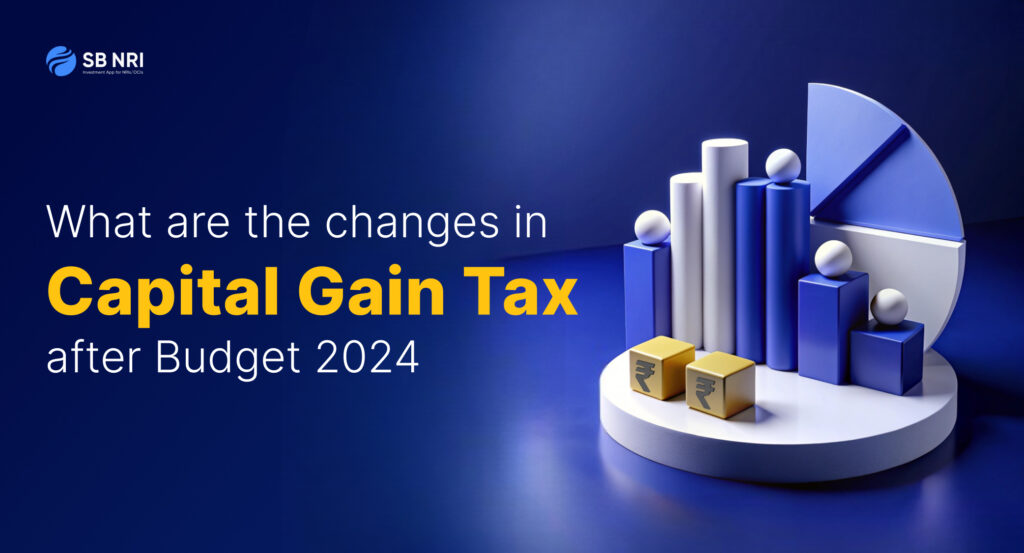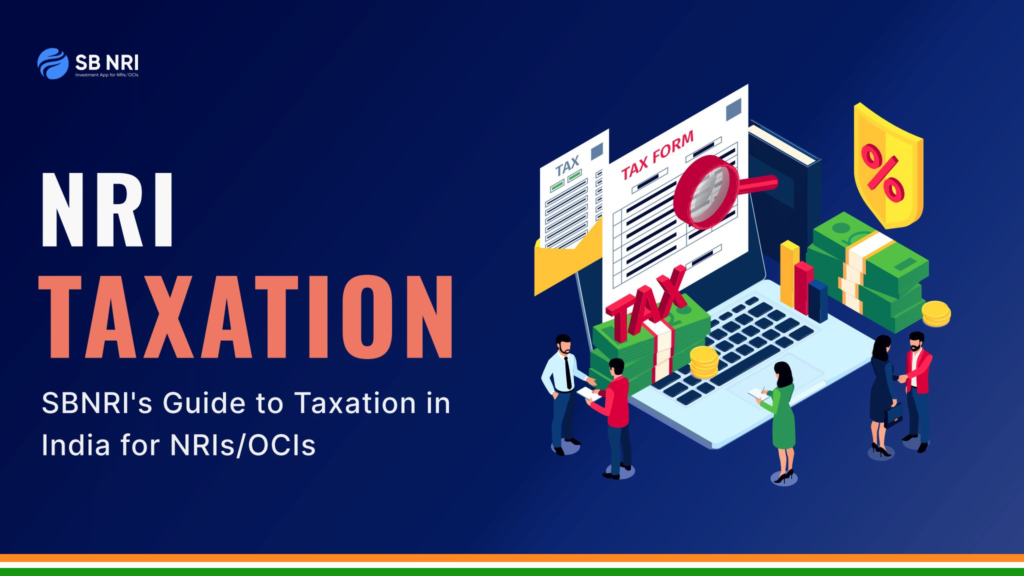
The Budget 2024, presented by Finance Minister Nirmala Sitharaman, brought several key updates to the tax landscape, including significant changes to the capital gain tax regime. These adjustments are aimed at simplifying the tax structure and enhancing investor sentiment. Here’s a detailed look at the major changes in capital gain tax introduced in the Budget 2024 and they mean for residents, Non-Resident Indian(NRI), Overseas Citizen of India(OCI), Hindu Undivided Family (HUFs) and more.
Increased Long-Term Capital Gains (LTCG) Limit after Budget 2024
One of the most notable changes is the increase in the Long-Term Capital Gains (LTCG) exemption limit. Previously set at Rs 1 lakh, the new limit has been raised to Rs 1.25 lakh. This change provides a higher threshold for long-term capital gains, allowing investors to benefit from a larger exemption before any tax is levied. This adjustment is expected to ease the tax burden on long-term investors and encourage long-term investment in equities and other assets.
Also read: Budget 2024 Highlights: Key Takeaways & Sectors to Watch Post-Budget
Revised LTCG Tax Rate after Budget 2024
Along with the increase in the exemption limit, the LTCG tax rate has also seen a revision. The rate has been updated from 10% to 12.5%. This change means that any capital gains exceeding the new exemption limit of Rs 1.25 lakh will be taxed at 12.5%. This adjustment aligns with the government’s aim to balance taxation while encouraging long-term investments in the financial markets.
Also read: Revised Income Tax Slabs for FY 2024-25
Changes to Capital Gains Tax for Property and Real Estate
The government has removed the indexation benefit from LTCG effective from the Budget 2024. The long-term capital gains (LTCG) tax on real estate was previously 20% with indexation benefits. While the LTCG rate has been reduced to 12.5%, the indexation benefits have been removed. The removal of indexation will likely increase the taxation liability for homeowners looking to sell their property as their realized capital gain will be much higher due to the absence of indexation benefits.
Abolition of Angel Tax
Another significant change is the complete abolition of Angel Tax across all categories of taxpayers. Angel Tax, which was previously levied on investments made by investors in startups and unlisted companies, often posed a challenge for startups seeking funding. Its removal is expected to streamline the funding process for startups, making it easier for them to attract investments without the burden of additional tax liabilities.
No TDS on Mutual Fund Withdrawals
A major relief for mutual fund investors is the removal of the Tax Deducted at Source (TDS) on mutual fund withdrawals. Previously, a TDS of 20% was applicable on repurchases by mutual funds or the sale of units. This change is designed to enhance liquidity for investors and simplify the tax process for mutual fund transactions. Investors will now be able to withdraw their funds without the hassle of TDS deduction at the time of redemption.
Also read: NRI Income Tax Slab Rates for FY 2023-24 (AY 2024-25)
Summary of Changes in Capital Gain after Budget 2024
- LTCG Limit: Increased to Rs 1.25 lakh.
- LTCG Tax Rate: Revised to 12.5%.
- Angel Tax: Abolished across all categories.
- TDS on Mutual Funds: Removed.
Also read: Penalty for Non-filing of ITR by Due Date: Know all the Rules
When do Budget Tax changes take effect?
The changes in tax rates and other tax-related provisions announced in the Union Budget typically take effect from the start of the new financial year, which is April 1st. This means that the new tax rates, revised deductions, and other changes will apply to the income earned from April 1st of the current year to March 31st of the following year. For instance, the changes announced in the Budget 2024 will be applicable for the financial year 2024-25, and individuals will see these changes reflected when filing their income tax returns in the assessment year 2025-26. For capital gains, the new rules will start effective from the date of the Budget 2024 announcement, i.e. 23 July 2024.
Also Read: 5 Ways to save on the tax NRIs have to pay
Wrapping Up
The changes introduced in the Budget 2024 regarding capital gains are designed to simplify the tax regime, reduce the tax burden on investors, and promote long-term investment and renewable energy. These measures are expected to boost investor confidence, enhance market liquidity, and support the growth of startups and the renewable energy sector. As these changes take effect from the new financial year, investors and businesses alike should take note to optimize their tax planning strategies accordingly.
Access SBNRI’s Exclusive NRI Taxation Guide

NRIs and OCIs can now access SBNRI’s exclusive NRI Taxation Guide covering in-depth information about DTAA, Gift Tax, Rental Income Tax, ITR Filing, Types of ITR Forms for NRIs, Capital Gain Tax, Income Tax, and more. The report will help you understand India taxation on mutual funds, other asset classes and how you can comply with the regulations.
Access NRI Taxation Guide here
Calculate your TDS Refund with SBNRI’s TDS Refund Calculator
A TDS refund is the process of reclaiming the excess tax deducted at source by the payer if the actual tax liability of the taxpayer is lower than the TDS deducted. This situation typically arises when the income tax calculated on the total income is less than the TDS already deducted. To claim a TDS refund, taxpayers need to file an income tax return (ITR). The Income Tax Department processes the ITR and verifies the details. If the tax department finds that the TDS paid is more than the actual tax liability, the excess amount is refunded to the taxpayer.
You can easily find out how much tax refund you can get by calculating your TDS Refund from this TDS Refund Calculator.
Looking for NRI ITR Filing? Connect with SBNRI NRI Tax Expert CA Today!

At SBNRI, we have simplified ITR filing for NRIs/OCIs through a smooth digital journey. Be it Basic Filing, Advanced Filing (includes Capital Gain, etc.), or Premium Filing (Foreign Income), we can help you assess the right computation and lower your tax liability.
“We’ve helped over 500+ NRIs/OCIs file ITR returns and more than 25,000+ across other taxation services last financial year and we’d love to help you out too”
You can download SBNRI App or connect with NRI Tax Expert team directly via the button below.
FAQs
What is the new Long Term Capital Gains (LTCG) tax rate?
The LTCG tax rate has been revised to 12.5%, and the LTCG limit has been increased to Rs 1.25 lakh per year from Rs 1 lakh.
Is Angel Tax still applicable?
No, Angel Tax has been abolished across all categories of taxpayers.
What are the new capital gains tax rates introduced in Budget 2024?
The long-term capital gains (LTCG) tax rate has been increased from 10% to 12.5%, and the exemption limit for LTCG has been raised from Rs 1 lakh to Rs 1.25 lakh per year.
Who will be most affected by the changes in capital gains tax?
Individuals earning more than Rs 1.25 lakh per year in long-term capital gains will be most affected by the new tax rate, as they will now pay a higher rate of 12.5% compared to the previous 10%.
What changes were made to the standard deduction under the new regime?
The standard deduction under the new tax regime has been increased from Rs 50,000 to Rs 75,000, providing more relief to taxpayers.
Are there any changes to the tax slabs in Budget 2024?
Yes, the revised tax slabs under the new regime are: 0-3 lakhs (Nil), 3-7 lakhs (5%), 7-10 lakhs (10%), 10-12 lakhs (15%), 12-15 lakhs (20%), and above 15 lakhs (30%).
Has the Angel Tax been affected by Budget 2024?
The Angel Tax has been abolished across all categories of taxpayers, which is expected to benefit startups and investors.
What are the new TDS rules for mutual fund withdrawals?
The 20% TDS on mutual fund (MF) withdrawals has been removed, which will ease the liquidity for investors in mutual funds.
When do the new capital gains tax changes take effect?
The new changes to capital gains tax will take effect from April 1, 2024.
How will the new capital gains tax affect small investors?
Small investors with annual long-term capital gains up to Rs 1.25 lakh will not be affected by the new tax rate, as they will still be within the exempted limit.
What is the impact of the new capital gains tax on high-income earners?
High-income earners with substantial long-term capital gains will face higher tax liabilities due to the increased LTCG tax rate of 12.5%.
How do the changes in capital gains tax align with the government’s fiscal policies?
The changes in capital gains tax are part of the government’s efforts to increase tax revenues and support fiscal consolidation while providing targeted benefits to middle-income taxpayers and startups.



